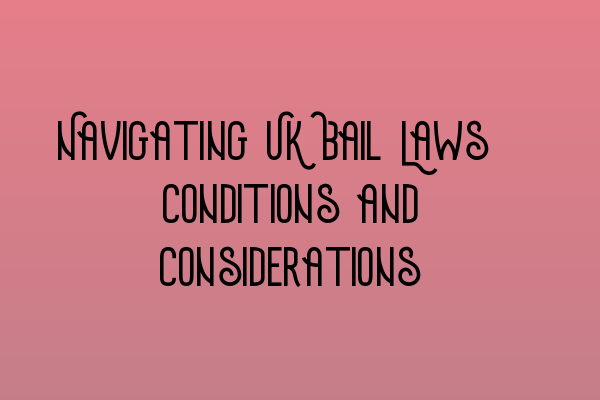Navigating UK Bail Laws: Conditions and Considerations
Welcome to our comprehensive guide on navigating UK bail laws. Understanding the conditions and considerations surrounding bail is essential for legal professionals, defendants, and anyone involved in the criminal justice system. In this article, we will explore the key aspects of bail and provide valuable insights on how to navigate these laws successfully.
What is Bail?
Bail refers to the temporary release of a defendant who is awaiting trial or sentencing. It is an opportunity for the accused to be released from custody while their case progresses through the legal system. However, the granting of bail is subject to specific conditions and considerations.
The Conditions of Bail
When granting bail, the court imposes certain conditions that the defendant must adhere to. These conditions aim to ensure the defendant’s compliance with the legal process and prevent them from committing further crimes or interfering with witnesses. Some common conditions of bail include:
- Regular Reporting: Defendants may be required to regularly report to a designated police station or probation office.
- Residence: The court may specify that the defendant must reside at a particular address during the bail period.
- Curfew: A curfew may be imposed, restricting the defendant’s movements during specific hours.
- Non-Contact: The defendant may be prohibited from contacting certain individuals involved in the case.
- Surrendering Passports: In some cases, the court may require the defendant to surrender their passport to prevent them from leaving the country.
- Surety: A surety, usually in the form of a financial bond, may be required to guarantee the defendant’s appearance in court.
To fully comprehend the conditions of bail and their implications, it is crucial to seek professional legal advice. Our experienced solicitors at SQE Criminal Law & Practice Law UK can provide the guidance you need.
Considerations and Factors Influencing Bail Decisions
When determining whether to grant bail, the court takes into account several factors. These considerations include:
- Flight Risk: The likelihood of the defendant fleeing the country to avoid standing trial.
- Public Safety: The potential risk the defendant poses to the public if released on bail.
- Previous Criminal Record: The defendant’s previous criminal history and any relevant convictions.
- Seriousness of the Offense: The nature and severity of the alleged offense.
- Community Ties: The defendant’s ties to the local community, such as employment and family commitments.
It is crucial to present a strong case and provide compelling arguments if you are seeking bail for a defendant. Our team of solicitors at SQE Criminal Law & Practice Law UK has expertise in bail applications and can assist you in making a persuasive case.
Conclusion
Navigating UK bail laws can be complex and challenging. Understanding the conditions and considerations surrounding bail is crucial for legal professionals and defendants alike. By familiarizing yourself with the bail process and seeking expert advice, you can navigate these laws successfully.
For further assistance with SQE preparation, such as practice exam questions, mocks, and courses, please refer to our related articles:
- SQE 1 Practice Exam Questions
- SQE 1 Practice Mocks FLK1 FLK2
- SQE 2 Preparation Courses
- SQE 1 Preparation Courses
- SRA SQE Exam Dates
At SQE Criminal Law & Practice Law UK, we are dedicated to providing top-notch legal education and support. Contact us today to learn more about our services and how we can assist you in your legal journey.
